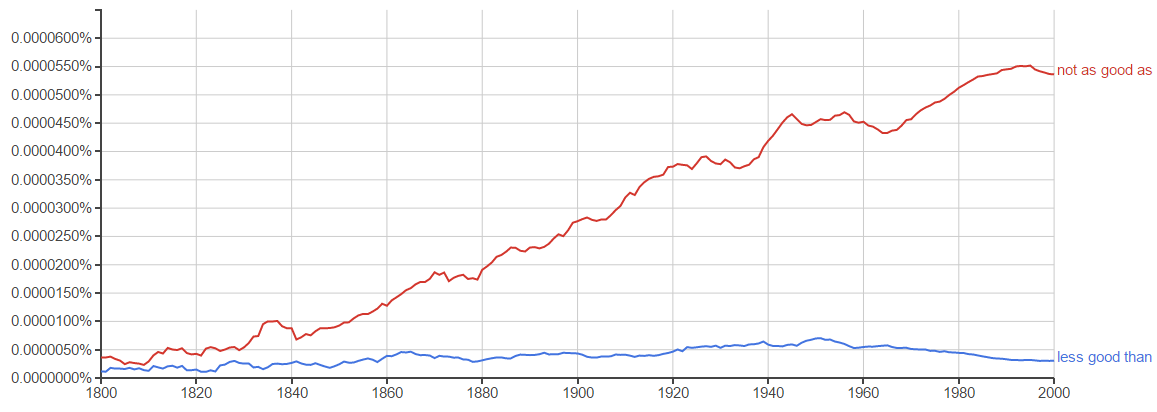Is "less good" acceptable?
Rise to the top 3% as a developer or hire one of them at Toptal: https://topt.al/25cXVn
--------------------------------------------------
Music by Eric Matyas
https://www.soundimage.org
Track title: Unforgiving Himalayas Looping
--
Chapters
00:00 Is &Quot;Less Good&Quot; Acceptable?
00:40 Answer 1 Score 20
01:02 Accepted Answer Score 23
02:22 Answer 3 Score 6
03:44 Answer 4 Score 2
04:37 Thank you
--
Full question
https://english.stackexchange.com/questi...
--
Content licensed under CC BY-SA
https://meta.stackexchange.com/help/lice...
--
Tags
#meaning #wordusage #comparatives
#avk47
ACCEPTED ANSWER
Score 23
The Oxford Learners Dictionaries defines worse as, among other things, less good. So I suppose if OLD can use less good, so can we. Still, when comparing two good things I would say:
A 90% score is good, but not as good as 100%.
My admittedly foreign ears don't like the sound of less good than. Google search concurs: not as good as beats less good than 6,000 to 1. This English Grammar advises against less good than on the grounds that "[w]hen making negative comparisons less tends to be used only with multi-syllable adjectives."
Five months later I’m tremendously upset that fickle Google search has not as good as beating less good than 470 to 1 only. I swear it was 6000 to 1 when I first looked into it. Oops, it’s only 17 to 1 in the Ngram. But I include it below hoping it proves more constant. The first few pages of Google books search for less good than return almost only religion and philosophy books. They have more good too (my emphasis):
A degreed property is a property that can be had in different degrees. Goodness is an obvious example of a degreed property. Something can be more good or less good than something else. (David E. Alexander, Goodness, God, and Evil, Continuum, 2012, p. 115.)
ANSWER 2
Score 20
There are differences in meaning between worse and less good.
Pancakes with butter taste good, but less good than pancakes with butter and syrup.
If I say that pancakes with butter taste worse than pancakes with butter and syrup, I mean that pancakes taste bad, and some toppings are more bad, rather than less good.
ANSWER 3
Score 6
"Less good" is a rather uncommon phrase; it's usually used incorrectly by people that have a weak command of the English language (at least, in the United States of America). Of course, you could construct a sentence where "less good" is perfectly appropriate. This occurs when you're comparing two things that are good (things that are done for some benefit), but one is of a lesser degree than the other.
Saving money later does less good than saving money earlier.
CPR does less good than avoiding an accident.
In this case, "less good" is equivalent to "is not as good as" (with some other minor word changes). In this context, "good" is basically a stand-in for a type of quantity (thanks to @LessPop_MoreFizz for the comment).
The usage of "less" here is the same as we might compare two actual quantities: "5 is less than 10". Less is a comparison of two quantities, so you should actually have two different things that can be compared in a quantifiable manner. "Less" typically goes between two things that are being compared.
For example, you should avoid less good in the following sentence:
I did less good on that test.
In this case, you're not actually comparing two things, so you'd probably go with one of:
I didn't do well on that test.
I did worse on that test than my previous tests.
Or, in response to a question:
How did you do on that test? Not so good.
ANSWER 4
Score 2
I've heard "less good" in two contexts:
People using it where "worse" or "not as good" would normally be used. Usually these are people for whom English is not their native language, but not always. It's not mainstream usage for native speakers in my experience.
People with excellent command of English using it ironically instead of "bad," for emphasis, e.g.:
"Okay, we use this ladder to get across. Just don't look down at the 12 storey drop. The ladder's old, but the wood's solid, we should be good."
"But what if it breaks when we're half-way across?"
"That would be...less good."
What forces me to use worse instead of less good then?
Just convention, nothing else, as with most language. Instead of "less good," we use "worse" or "not as good" depending on the sentence. Instead of "more good," we use "better."
